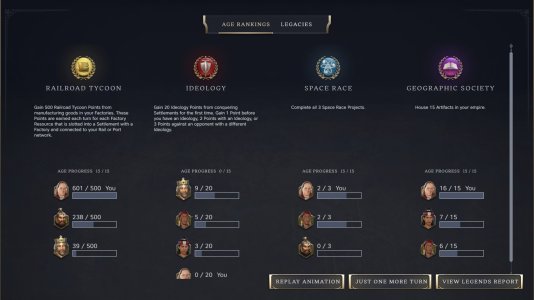beorn
Prince
Responding as a player who plays only single player, usually at Sovereign difficulty, and leans more towards builder strategies than militaristic strategies. Who reads/watches very little as far as picking up on expert players' advice. (And who avoids exploits)
1) The game is now far more compelling. Especially during Antiquity. Opponents keep things interesting and can compete in terms of culture generation, science generation, and many of the Legacy Paths. Also, they make intelligent decisions regarding the use of influence and treatment of Independents. In fact, I have seen Distant Land civs at the start of Exploration so powerful I wonder how they got that way.
2) AI military tactics are still not a strength, but in my own opinion, this is not crucial because what with the settlement limit, I rarely want to take enemy cities anyway. I can find better locations myself, and conquest is a last resort... However, Independents seem somewhat more threatening militarily now, which is a huge plus.
3) Crises went off the rails. At first, it was as though when an era reached 70%, it was as though Firaxis released a swarm of mosquitoes around the player -- the crisis has zero impact on strategy or outcome, but they were super annoying. Post patch, it's as though Firaxis crashed your computer -- the crisis wrecks everything, cannot possibly be ignored (I'm looking at you, plague), but there is so little sense of player agency that it's just stupid through and through.
4) But the core problem remains. You can turn off crises, but it's a bad idea because they are the only thing distracting you from deep problems with the ends of eras (Antiquity and Exploration). In each case, the smart play is to quit thinking of it as a historical game, avoid building unnecessary buildings which will weigh you down at the start of the next era, and do a bunch of things that feel ultra board-gamey. Oh, I'll need another military leader next era. Add a bunch of pointless trade routes, so you can take that bonus going into the next era. Build units that will carry over. Place missionaries on your settlements but wait for the final turn so that no one can flip them back and cost you the military legacy points. Etc. I like the idea of ages, but it seems to me that they did not work out how to end them while maintaining a historical game. And they are hiding this behind a crisis system that simply makes the problem worse.
5) Food and city growth is far better, far more fun, far more similar to how cities actually grow. Though I still think the food-based civs are a bit weak and need some help.
1) The game is now far more compelling. Especially during Antiquity. Opponents keep things interesting and can compete in terms of culture generation, science generation, and many of the Legacy Paths. Also, they make intelligent decisions regarding the use of influence and treatment of Independents. In fact, I have seen Distant Land civs at the start of Exploration so powerful I wonder how they got that way.
2) AI military tactics are still not a strength, but in my own opinion, this is not crucial because what with the settlement limit, I rarely want to take enemy cities anyway. I can find better locations myself, and conquest is a last resort... However, Independents seem somewhat more threatening militarily now, which is a huge plus.
3) Crises went off the rails. At first, it was as though when an era reached 70%, it was as though Firaxis released a swarm of mosquitoes around the player -- the crisis has zero impact on strategy or outcome, but they were super annoying. Post patch, it's as though Firaxis crashed your computer -- the crisis wrecks everything, cannot possibly be ignored (I'm looking at you, plague), but there is so little sense of player agency that it's just stupid through and through.
4) But the core problem remains. You can turn off crises, but it's a bad idea because they are the only thing distracting you from deep problems with the ends of eras (Antiquity and Exploration). In each case, the smart play is to quit thinking of it as a historical game, avoid building unnecessary buildings which will weigh you down at the start of the next era, and do a bunch of things that feel ultra board-gamey. Oh, I'll need another military leader next era. Add a bunch of pointless trade routes, so you can take that bonus going into the next era. Build units that will carry over. Place missionaries on your settlements but wait for the final turn so that no one can flip them back and cost you the military legacy points. Etc. I like the idea of ages, but it seems to me that they did not work out how to end them while maintaining a historical game. And they are hiding this behind a crisis system that simply makes the problem worse.
5) Food and city growth is far better, far more fun, far more similar to how cities actually grow. Though I still think the food-based civs are a bit weak and need some help.

 But thanks!
But thanks!